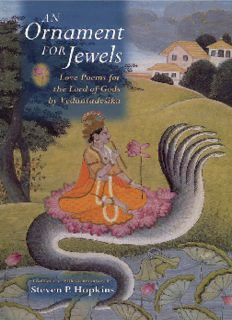
An Ornament for Jewels: Love Poems For The Lord of Gods, by Venkatesa PDF
Preview An Ornament for Jewels: Love Poems For The Lord of Gods, by Venkatesa
An Ornament for Jewels This page intentionally left blank An Ornament for Jewels Love Poems for the Lord of Gods by Veda¯ntadesika translations with commentary by steven p. hopkins 1 2007 1 OxfordUniversityPress,Inc.,publishesworksthatfurther OxfordUniversity’sobjectiveofexcellence inresearch,scholarship,andeducation. Oxford NewYork Auckland CapeTown DaresSalaam HongKong Karachi KualaLumpur Madrid Melbourne MexicoCity Nairobi NewDelhi Shanghai Taipei Toronto Withofficesin Argentina Austria Brazil Chile CzechRepublic France Greece Guatemala Hungary Italy Japan Poland Portugal Singapore SouthKorea Switzerland Thailand Turkey Ukraine Vietnam Copyright#2007byOxfordUniversityPress,Inc. PublishedbyOxfordUniversityPress,Inc. 198MadisonAvenue,NewYork,NewYork10016 www.oup.com OxfordisaregisteredtrademarkofOxfordUniversityPress Allrightsreserved.Nopartofthispublicationmaybereproduced, storedinaretrievalsystem,ortransmitted,inanyformorbyanymeans, electronic,mechanical,photocopying,recording,orotherwise, withoutthepriorpermissionofOxfordUniversityPress. LibraryofCongressCataloging-in-PublicationData Vexkatanatha,1268–1369. [Poems.Polyglot.Selections] Anornamentforjewels:lovepoemsfortheLordofGods/ byVedantadesika;[editedandtranslatedby]StevenP.Hopkins. p.cm. IncludestranslationsfromTamil,Sanskrit,andMaharastriPrakrit. Includesbibliographicalreferencesandindex. ISBN978-0-19-532639-0; 978-0-19-532640-6(pbk.) 1. Vishnu(Hindudeity)—Poetry. 2. Religiouspoetry,Indic— TranslationsintoEnglish. 3. Vexkatanatha,1268–1369— TranslationsintoEnglish. I. Hopkins,StevenP. II. Title. PL4758.9.V4255A22007 891'.21—dc22 2006053259 9 8 7 6 5 4 3 2 1 PrintedintheUnitedStatesofAmerica onacid-freepaper For Raimon Panikkar and in memory of A. K. Ramanujan (1929–1993) This page intentionally left blank And Vexkatesa, the poet composing these verses of praise for You shines a singer of Truth! —Vedantadesika, Devana¯yakapa˜nca¯sat 53 This page intentionally left blank Preface These translations andthis labor to cross overthree distinct South Asian languages—Sanskrit, Tamil,and Maharaqtr¯ıPrakrit—into the foreign territories ofAmerican English,is thework ofover adecade thatbeganwithaconversationIhadonemorningwiththelatescholar and poet A. K.Ramanujan. We were walking through thestreets of Cambridge, Massachusetts, from the Center for theStudyof World Religions, where we wereboth living at thetime, to Harvard Yard. I had been givingRaman myown poetry,and wasstrugglingto find therightfocusfor my dissertationwork. He told methen that everything he hadthought or written about Indian culture,folklore, or literaturebegan with theact oftranslation;that thisencounter formedacenteraroundwhichhisthinkingandhisoriginalpoetryin English andKannada always turned.He told me to finda poet, or a bodyof poetry, preferably in a vernacularlanguage, thatI could translate,andinthiswayIwould‘‘keepthepoetry’’inmyownvoice, through thevoicesofother poets, while I pursued myscholarly studiesand an academiccareer.And indeed, reading Ramanujan’s remarkable translations from the Tamil ofNammalvar andthe (cid:1) ‘‘classical’’ Tamil caxkam poetry had first inspired me to study the originals, and to seek my own voice as atranslator-poet andscholar. After thisconversation,it wasnot long before Ifoundmy poet, Vedantadesika,withthehelpofCSWRcolleagueandfellowSanskrit studentTamar Reich. I began then atask I continue today:translat- ingpoemsfromSanskrit,Tamil,andPrakritbyafourteenth-century
Description: